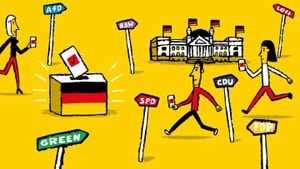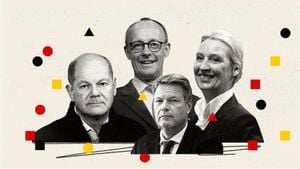Germany heads to the polls on February 23, 2025, to elect its new leader amid the backdrop of rising far-right sentiments and shifting political dynamics.
The general elections come 15 months after the collapse of the coalition government led by Chancellor Olaf Scholz of the Social Democrats (SPD), following disagreements about the country's economic direction. The fallout led to his dismissal of the finance minister and the eventual dissolution of the Bundestag by President Frank-Walter Steinmeier.
Polling suggests the Christian Democratic Union (CDU), under the leadership of Friedrich Merz, is poised to make significant electoral gains, with early projections showing them leading with around 30% of the vote. The right-wing Alternative for Germany (AfD), helmed by Alice Weidel, is projected to take second place with about 20%, marking its potential for the highest votes received since its inception.
Scholz, who is seeking re-election, faces immense challenges, evidenced by the SPD's dip to third place with preliminary polling around 15%. His government has faced backlash after experiencing dwindling popularity—largely attributed to economic concerns and his handling of immigration policy. Numerous debates surrounding immigration have dominated the campaign, fundamentally altering the political narrative and drawing sharp divisions among the electorate.
The elections employ Germany's unique parliamentary system, where voters cast two votes: the first for candidate representatives from their local districts (Erststimme) and the second for party lists (Zweitstimme). This dual-vote system ensures representation for smaller parties as well as larger ones, with any party exceeding 5% of the vote gaining seats within the Bundestag. A total of 630 Bundestag seats are available for the upcoming elections.
Friedrich Merz has firmly stated his intent to avoid any coalition with the AfD due to its extreme positions on immigration and nationalism. His preferred coalition appears to favor negotiations with the SPD or the Green Party, aiming for stability and governance without relying on far-right elements. Reports indicate the possibility of forming alliances with other center-oriented parties remains complicated, as political ideologies are increasingly polarized.
Meanwhile, Alice Weidel of the AfD has denied the label of extreme right-wing, arguing it insults millions of voters and stating, “We represent those voters.” The AfD gained traction by emphasizing anti-immigration sentiments, which have particularly reverberated since recent violent incidents linked to asylum seekers.
Political observers have noted the emergence of the Die Linke (The Left) party as another player to watch, especially among younger voters. Their candidate, Heidi Reichinnek, has sparked interest and galvanization among the youth due to her strident anti-fascist rhetoric. Surveys indicate this party surprisingly shifted from lagging below 5% to garnering between 7% to 9% support as the voting day approaches, underscoring the shifting nature of Germany's political affiliations.
With 61 million eligible voters, including 2.3 million first-time voters, electoral participation is expected to reflect the German electorate's engagement with pressing issues, including immigration, economic policies, and social justice. Voting hours commence at 8:00 AM local time and will conclude at 6:00 PM, allowing ample opportunity for all eligible voters to participate.
The significance of these elections extends beyond German borders, as the new leadership will potentially reshape Germany's role within the European Union, influencing broader continental dynamics amid the unpredictability presented by American policies under Donald Trump.
Whether Friedrich Merz will successfully navigate coalition-building after the elections remains uncertain. Should he fail to secure the necessary agreements, Germany faces the possibility of returning to the polls within weeks. The results will dictate the future of German governance and its socio-political framework for years to come.
For many Germans, these elections represent more than choosing new leaders; they symbolize choices about the direction of their nation and the ideals it embodies.



